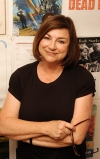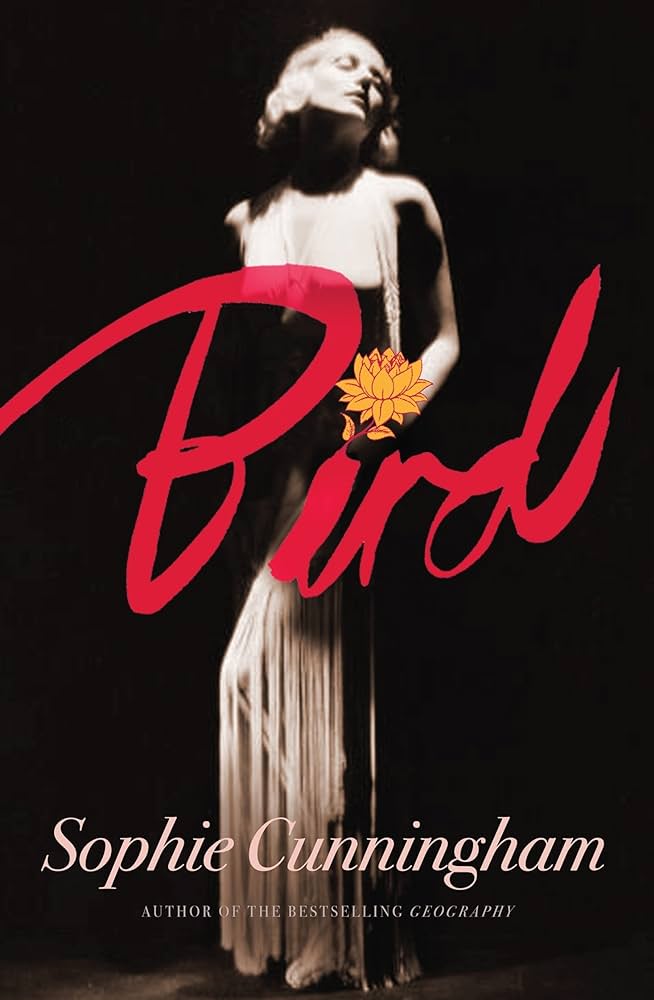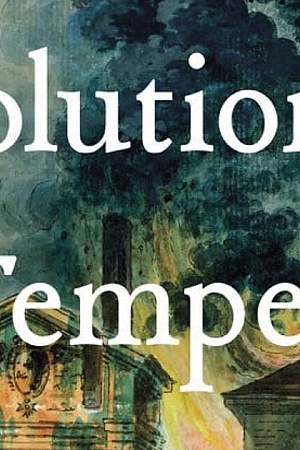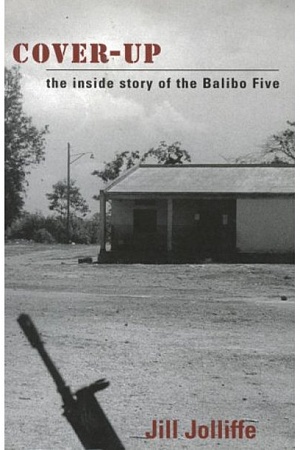Bird
Text, $32.95 pb, 266 pp
Dharma is a girl’s best friend
Get out that DVD of Gentlemen Prefer Blondes. Locate the scene with Marilyn Monroe in the pink satin strapless number, singing ‘Diamonds Are a Girl’s Best Friend’. Study the dancers and find that statuesque blonde in the black bustier posing as a human candelabrum. That’s Anna David. (Her best friend, Eleanor Phillips, is one of the all-American girls with pink roses in their hair). It wasn’t Anna’s first film – if you’re very alert you can spot her in All About Eve – and it wasn’t her last. Hitchcock cast her as Kim Novak’s double in Vertigo, and Tippi Hedren’s in The Birds.
Full Hollywood stardom eluded Anna. Despite the exotic looks, her Russian accent made acting a problem. But she had a beautiful voice and sang ‘Summertime’ to Charlie ‘Bird’ Parker’s saxophone, partied with famous names and married a movie producer. Domestic abuse and heroin addiction took their toll. In the mid 1950s she moved to Paris with her new lover, a Beat poet. That didn’t work out either, but after working as a stripper and dabbling in spiritualism, she discovered Buddhism. The next stop was Darjeeling, where she began the search for peace and enlightenment via the teachings of two Tibetan lamas. Later she became a Buddhist nun, and the three of them founded a monastery in Nepal which became popular with Westerners. Anna, aged just forty-three, died alone and rather mysteriously during a meditative retreat in a cave a few years later.
Only some of this story is factual. Anna Davidoff is a fictional creation, the eponymous heroine of Sophie Cunningham’s second novel, Bird, inspired by the lives of Zina Rachevsky, Lama Zopa Ripoche, and Lama Yeshe, who did indeed found a monastery together in Nepal in the 1970s.
There are various colourful and inaccurate versions of Zina’s life on the internet. She was not a Russian princess or even Russian. She was born in New York in 1930, her German-Jewish ancestors having migrated to the United States in the 1850s. Blonde, beautiful and curvy, she appeared in a few Hollywood films and became a Paris showgirl, a party girl and a friend of the Beat poets. She went to Darjeeling in 1967 with her small daughter Rhea, and met Lama Yeshe, then about twenty-two years old, and Lama Zopa, who became her teachers and co-founders of the Kopan Monastery in Nepal. Instrumental in introducing many Westerners to Buddhism, she died as a nun, possibly from peritonitis, at a meditation retreat in the early 1970s.
That’s quite a life. Given Cunningham’s interest in Buddhism, film and pop culture, which also underpinned her first novel Geography (2005), one can understand what drew her to writing about Rachevsky, or somebody very like her. She has fictionalised her heroine Anna’s early life, and invented a more glamorous film career for her, but has stuck closely to published accounts of Zina’s activities on the hippie trail in Ceylon, India and Nepal and of her relationship with her Tibetan lamas, so much so that I was surprised she did not cite Jamyang Wangmo’s The Lawudo Lama (2005) in her extensive list of references.
Like Catherine in Geography, Anna’s life has been touched by people who have died, disappeared or been left behind. Catherine was chasing a father; Ana-Sofia, Anna’s daughter, is chasing a mother. Abandoned at the age of five when her mother went off to Nepal to become a nun, Ana-Sofia (or Az) has been raised by Eleanor, and now, some thirty years later, she is a Manhattan-based editor who lives alone with a cat, has a small circle of friends and a new man in her life. She is the same age as Anna when she died, which seems to be the catalyst for her sudden decision to abandon everything and go to India to find out more about her mother.
Information is also provided by Eleanor, who communicates her memories by letter, and on cassette recordings from Lama Dorje Rinpoche, one of the co-founders of the Nepalese monastery. Other recollections are contributed by the Beat poet Gabriel, who briefly shared her life in Paris, and Ian, Anna’s homosexual husband, whom she married in Calcutta. Told by three different first-person narrators, with corresponding jumps in time and place, the story sometimes becomes a little confusing. In most cases, the solution is not to go back but to keep on reading and trust that light will be shed by another narrator.
Cunningham studs the narrative with famous people who cross Anna’s path at various stages of her adult life – Ginsberg, Hitchcock, Bhagavan Das, Parker, Burroughs – and other references that evoke a particular time or place. Anna introduces her lamas to the music of the Beatles and the Stones; her Beat poet is a friend of Jack Kerouac; Eleanor opens a vegetarian restaurant called Serendipity in Haight Ashbury during the Summer of Love; Ian and Az march for Gay Pride in 1985 as Aids depletes the ranks.
As a character, however, and given the fascinating material of her life, Anna is less interesting than you might have supposed, mainly because the various first-person narrators are limited in what they know about her, and their accounts sometimes have all the depth of magazine profiles. We learn a great deal about what she did but little about her feelings and motivations. This may be intentional – Anna is ultimately unknowable – but it does not make for an engrossing or satisfying story. Former hippies, Beatniks, flower children and others who wandered the Eastern path to spiritual enlightenment in the latter half of the twentieth-century may think differently















Leave a comment
If you are an ABR subscriber, you will need to sign in to post a comment.
If you have forgotten your sign in details, or if you receive an error message when trying to submit your comment, please email your comment (and the name of the article to which it relates) to ABR Comments. We will review your comment and, subject to approval, we will post it under your name.
Please note that all comments must be approved by ABR and comply with our Terms & Conditions.